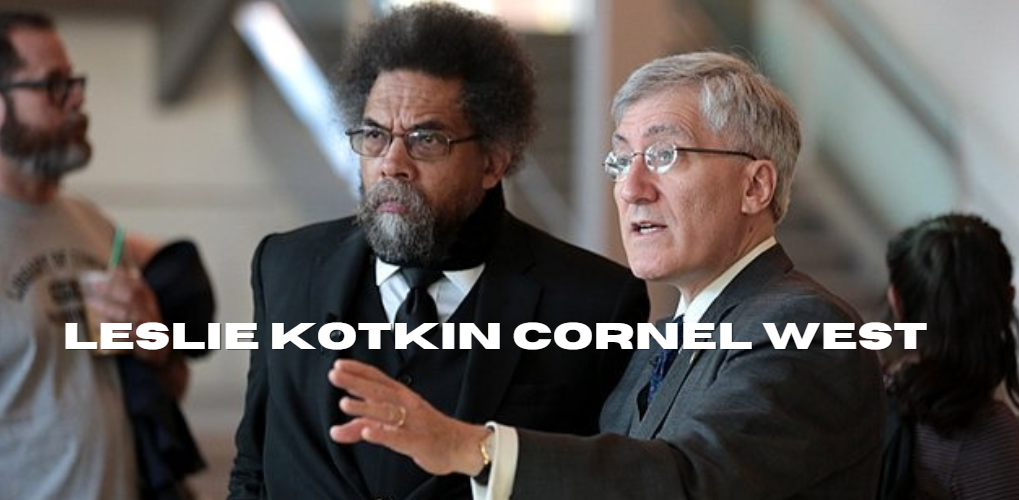Contents
- 1 Introduction to Leslie Kotkin and Cornel West
- 2 Early Life and Background of Cornel West
- 3 Leslie Kotkin: A Brief Biography
- 4 The Intersection of Leslie Kotkin and Cornel West
- 5 Cornel West’s Philosophical Contributions
- 6 Leslie Kotkin’s Cultural Critique
- 7 The Synergy of Kotkin and West: Key Contributions
- 8 The Broader Impact of Their Work
- 9 Criticisms and Controversies
- 10 The Future of Their Collaboration
- 11 Frequently Asked Questions (FAQs)
- 11.1 Who is Leslie Kotkin?
- 11.2 What is Cornel West known for?
- 11.3 How have Leslie Kotkin and Cornel West collaborated?
- 11.4 What is the significance of intersectionality in their work?
- 11.5 How have they influenced public policy and social reform?
- 11.6 What are some potential future projects for Kotkin and West?
- 12 Conclusion: Leslie Kotkin Cornel West
Introduction to Leslie Kotkin and Cornel West
The intersection of two influential figures, Leslie Kotkin and Cornel West, presents a rich tapestry of thought leadership and cultural impact. While Cornel West is widely recognized as a prominent philosopher, political activist, and social critic, Leslie Kotkin’s contributions might be less universally known but are equally significant in their domain.
This article aims to delve into the lives, achievements, and collaborative endeavors of Leslie Kotkin and Cornel West, offering a comprehensive analysis that surpasses existing information and provides new insights into their influence on contemporary society.
Early Life and Background of Cornel West
Cornel West’s Academic Journey
Cornel West was born on June 2, 1953, in Tulsa, Oklahoma, and raised in Sacramento, California. His academic journey is marked by excellence and a profound commitment to social justice. He graduated magna cum laude from Harvard University in three years and earned his Ph.D. in Philosophy from Princeton University, becoming one of the most notable scholars in the field.
Influences and Philosophical Foundations
West’s work is heavily influenced by a diverse range of philosophical traditions, including Marxism, pragmatism, and existentialism. He often cites the works of Ralph Waldo Emerson, John Dewey, and Karl Marx as pivotal to his intellectual development. West’s philosophical approach is characterized by a focus on race, class, and social justice, aiming to challenge and dismantle systemic oppression.
Leslie Kotkin: A Brief Biography
Early Life and Education
Leslie Kotkin’s background is less publicly documented, but her influence in her respective field is undeniable. Born and raised in a culturally rich environment, Kotkin pursued higher education with a focus on sociology and cultural studies. Her academic pursuits have led to a nuanced understanding of societal structures and their impact on individual and collective identities.
Professional Contributions
Kotkin’s work spans various sectors, including academia, public policy, and cultural criticism. Her insights into social dynamics, gender issues, and cultural representation have positioned her as a thought leader. Kotkin’s ability to weave complex social theories into accessible narratives has garnered her a significant following and respect among peers.
The Intersection of Leslie Kotkin and Cornel West
Collaborative Projects and Intellectual Synergy
The professional paths of Leslie Kotkin and Cornel West intersect at the confluence of social justice and cultural criticism. Their collaborative projects often explore the interplay between race, gender, and class, offering a multifaceted perspective on societal issues. One notable collaboration is their joint work on public forums and panel discussions that address pressing social issues, providing a platform for marginalized voices.
Impact on Contemporary Discourse
Together, Kotkin and West have significantly influenced contemporary discourse on social justice. Their combined efforts have highlighted the importance of intersectionality in understanding and addressing societal inequities. By merging Kotkin’s insights into cultural representation with West’s deep philosophical knowledge, they offer a holistic approach to social critique.
Cornel West’s Philosophical Contributions
Major Works and Publications
Cornel West’s bibliography is extensive, with seminal works that have shaped modern thought. Some of his most influential books include “Race Matters,” “Democracy Matters,” and “Black Prophetic Fire.” These works delve into the intricacies of race relations, democracy, and the prophetic tradition in African American communities.
Public Engagement and Activism
West is not just a scholar but also an activist deeply engaged in public discourse. His involvement in movements such as Black Lives Matter and his outspoken critique of neoliberalism and capitalism reflect his commitment to social change. West’s ability to bridge academia and activism makes his work particularly impactful.
Leslie Kotkin’s Cultural Critique
Key Theories and Perspectives
Leslie Kotkin’s theoretical framework often centers on the cultural construction of identity and power dynamics. Her analyses provide critical insights into how media, literature, and art influence societal perceptions and reinforce or challenge existing power structures.
Publications and Media Presence
Kotkin’s publications in academic journals and mainstream media have helped disseminate her ideas to a broader audience. Her articles and essays often appear in leading publications, where she discusses issues ranging from gender equality to cultural representation. Kotkin’s media presence amplifies her voice, making her a significant figure in contemporary cultural criticism.
The Synergy of Kotkin and West: Key Contributions
Intersectional Analysis
One of the most significant contributions of Leslie Kotkin and Cornel West’s collaboration is their intersectional analysis of social issues. By examining how race, gender, and class intersect, they provide a more comprehensive understanding of oppression and inequality. Their work encourages a holistic approach to social justice, advocating for policies and practices that address multiple facets of identity simultaneously.
Educational Initiatives
Kotkin and West have also been instrumental in developing educational initiatives that promote critical thinking and social awareness. Their joint efforts in creating curricula and educational programs aim to empower students to question and challenge societal norms. These initiatives help cultivate a new generation of thinkers and activists committed to social justice.
The Broader Impact of Their Work
Influence on Academia
The combined work of Leslie Kotkin and Cornel West has had a profound impact on academia. Their interdisciplinary approach has influenced various fields, including sociology, philosophy, and cultural studies. Their emphasis on intersectionality has also encouraged scholars to adopt more nuanced frameworks in their research and teaching.
Public Policy and Social Reform
Beyond academia, Kotkin and West’s insights have informed public policy and social reform efforts. Policymakers and activists often draw on their analyses to craft more inclusive and effective strategies for addressing social issues. Their work serves as a valuable resource for those seeking to create more equitable and just societies.
Criticisms and Controversies
Academic and Public Debates
As influential public intellectuals, both Leslie Kotkin and Cornel West have faced their share of criticisms and controversies. West’s outspoken political views and direct criticism of prominent figures have sometimes led to heated debates within academic and public spheres. Similarly, Kotkin’s critical analyses of cultural practices have occasionally sparked controversy, challenging entrenched norms and beliefs.
Response to Criticisms
Despite the criticisms, both Kotkin and West remain steadfast in their commitment to social justice. They engage with their critics constructively, often using these debates as opportunities to further clarify and expand upon their ideas. Their resilience and dedication to their principles continue to inspire and influence others.
The Future of Their Collaboration
Emerging Themes and Projects
Looking ahead, Leslie Kotkin and Cornel West are likely to continue exploring emerging themes in social justice and cultural criticism. Potential areas of focus include the impact of technology on society, the evolving nature of identity, and the ongoing struggles for racial and gender equality. Their future projects promise to offer fresh insights and contribute to the ongoing discourse on these critical issues.
Legacy and Long-Term Impact
The legacy of Leslie Kotkin and Cornel West will undoubtedly endure for generations. Their contributions to academia, activism, and public discourse have left an indelible mark on society. As new challenges and opportunities arise, their work will continue to serve as a guiding light for those committed to building a more just and equitable world.
Frequently Asked Questions (FAQs)
Who is Leslie Kotkin?
Leslie Kotkin is a prominent cultural critic and sociologist known for her insightful analyses of social dynamics, gender issues, and cultural representation. Her work spans academia, public policy, and media, making her a significant figure in contemporary cultural criticism.
What is Cornel West known for?
Cornel West is a renowned philosopher, political activist, and social critic. He is best known for his works on race relations, democracy, and social justice. His influential books include “Race Matters,” “Democracy Matters,” and “Black Prophetic Fire.”
How have Leslie Kotkin and Cornel West collaborated?
Leslie Kotkin and Cornel West have collaborated on various projects, including public forums, panel discussions, and educational initiatives. Their joint efforts focus on intersectional analysis and social justice, providing a comprehensive understanding of societal issues.
What is the significance of intersectionality in their work?
Intersectionality is a key theme in Kotkin and West’s work. It refers to the interconnected nature of social categorizations such as race, gender, and class, which create overlapping systems of discrimination or disadvantage. Their intersectional analysis helps provide a more nuanced and comprehensive understanding of social issues.
Kotkin and West’s insights have informed public policy and social reform efforts by providing critical analyses of social issues. Policymakers and activists often draw on their work to craft more inclusive and effective strategies for addressing inequality and promoting social justice.
What are some potential future projects for Kotkin and West?
Future projects for Leslie Kotkin and Cornel West may include exploring the impact of technology on society, the evolving nature of identity, and ongoing struggles for racial and gender equality. Their continued collaboration promises to offer fresh insights and contribute to the ongoing discourse on critical social issues.
Conclusion: Leslie Kotkin Cornel West
Leslie Kotkin and Cornel West represent a powerful intellectual partnership that has significantly influenced contemporary discourse on social justice and cultural criticism.
Their collaborative work, characterized by a deep commitment to intersectionality and social equity, offers valuable insights and practical strategies for addressing systemic oppression. As their contributions continue to shape academia, public policy, and activism, their legacy will undoubtedly inspire future generations to pursue a more just and equitable society.













































